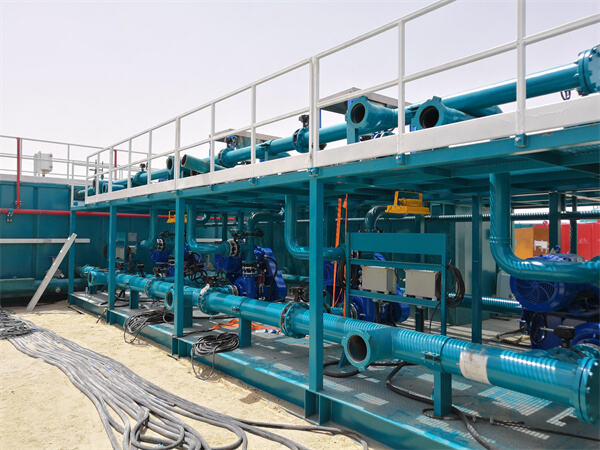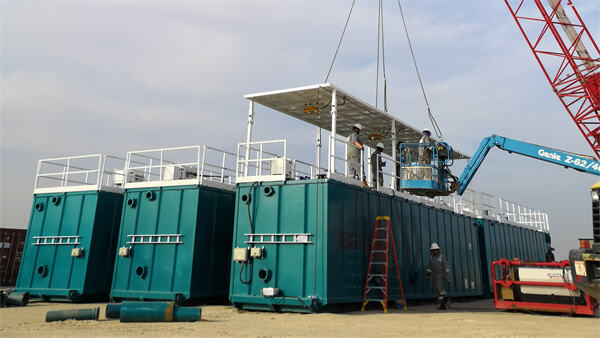ההבנה של התפקיד הקריטי בניהול פסולת תעשייתית
ניהול פסולת תעשייתית, במיוחד של שפכים שומניים, הפך לחשוב יותר ויותר בעולם המודע לסביבה כיום. טיפול בשמרים שמן מייצג אתגר משמעותי במספר תחומים, שכן ענפים משתדלים לשמור על יעילות תפעולית תוך עמידה בתקנות הסביבה החמות. זרם הפסולת המורכב זה, שכולל שמן, מים וחומרים מוצקים, דורש גישות טיפול מתקדמות כדי להבטיח סילוק תקין ושיקום משאבים פוטנציאלי.
פעולות תעשייתיות מודרניות מייצרות כמויות גדולות של פסולת שומנית, מה שהופך לפתרונות טיפול יעילים לא רק צורך סביבתי אלא גם דרישה תפעולית. הטיפול הנאות והעיבוד של חומרים אלו משפיע הן על עמידה בחוקים והן על יעדי קיימות ארגונית, ומחזק את הצורך בטכנולוגיות טיפול מתקדמות.
ענפים תעשייתיים מרכזיים העוסקים בפסולת שומנית
תעשיית נפט ורעילנים
תעשיית הנפט עומדת בחזית צרכי הטיפול בבוצה שמנית. בתי זיקוק מייצרים כמויות משמעותיות של בוצה שמנית במהלך עיבוד נפט גולמי, פעולות ניקוי מיכלים ופעילויות תחזוקה. מתקנים אלה מיישמים מערכות טיפול מקיפות לטיפול בזרימה הרציפה של פסולת, ולעתים קרובות משתמשים בשלבי טיפול מרובים כדי להפריד ולעבד רכיבים שונים של הבוצה.
מטמנים מודרניים משתמשים בטכנולוגיות טיפול מתקדמות כמו צנטריפוגה, טיפול כימי וטיפול ביולוגי כדי לנהל בצורה יעילה את זרמי הפסולת השמנים שלהם. פתרונות אלו לא רק עוזרים לעמוד בדרישות הסביבתיות, אלא גם מאפשרים שחזור של הידראקربונים בעלי ערך שניתן לעבד מחדש למוצרים שימושיים.
ייצור ותעשייה כבדה
מתקני ייצור, במיוחד אלו העוסקים בעיבוד מתכות ובתכנון כלי רכב, מתמודדים באופן קבוע עם שפכים שומניים מפעולות מכונה, מערכות קירור ופעילויות תחזוקה. התעשיות הללו דורשות פתרונות טיפול מיוחדים בשפכים שומניים כדי להתמודד עם הרכב הייחודי של זרמי הפסולת שלהן, אשר לרוב מכילים חלקיקי מתכת ונוזלי חיתוך.
מערכות טיפול מתקדמות בסביבות ייצור משתמשות לעיתים קרובות בטכנולוגיות סינון ובעיבוד כימי שמטרתן להפריד שמן מהמים ומזיהומים מוצקים. זה מאפשר ביצוע סילוק או מחזור נאות של כל רכיב תוך מינימום השפעה על הסביבה.

תפעול ימי וספנות
מתקנים נמליים וטרמינלים
בתפעול ימי נוצרות כמויות גדולות של פסולת שמנונית במהלך תחזוקת כלי שיט, עיבוד מים מהקופסה (Bilge) ופעילות בارיזה. יש לשירותי נמל לשמור על תשתיות עיבוד שומן עמידות כדי לשרת את הספינות העוגנות במפרסיהם. מערכות הטיפול האלה לעתים קרובות מתמודדות עם הרכב משתנה של פסולת שמנונית מסוגים שונים של ספינות ופעולות אספקה.
נמלי ים מודרניים משתמשים בטכנולוגיות טיפול מתקדמות שיכולות לעבד כמויות גדולות של פסולת שמנונית תוך עמידה בהוראות הסביבה הימיות החמות. פתרונות אלה כוללים לעתים קרובות מערכות הפרדת שמן-מים, תהליכי טיפול ביולוגיים וטכנולוגיות סינון מתקדמות.
תפעול בדונקים
תחנות ספנות מתמודדות עם אתגרים ייחודיים בניהול של רסס שמן שנוצר במהלך תיקון, תחזוקה ובניית כלי שיט. האופי המגוון של פעילויות בתחנות ספנות מחייב פתרונות טיפול גמישים, המסוגלים להתמודד עם זרמי פסולת שמניים שונים. מערכות טיפול במתקנים אלו כוללות לעתים קרובות מספר שלבי עיבוד, כדי להבטיח ניקוי מקיף והפרדה מלאה של שאריות זרות.
טכנולוגיות טיפול מתקדמות בתחנות ספנות עשויות לכלול יחידות הסקה תרמית, מערכות טיפול כימי, וציוד סינון מיוחד שעוצב במיוחד לטיפול בתכונות הספציפיות של פסולת שמנית הקשורה לתחום הימי.
ייצור אנרגיה ושימושים
תחנות כוח
מתקני ייצור חשמל, במיוחד אלו המשתמשים בדפיון, מייצרים באופן קבוע בוץ שמן ממספר תהליכים תפעוליים. למתקנים אלו נדרשות פתרונות טיפול יעילים לניהול פסולת ממערכות טיפול בדלק, תחזוקת ציוד ופעולות קירור. מערכות הטיפול חייבות להיות מסוגלות להתמודד הן עם זרמי פסולת שגרתיים והן עם עליות זמניות בנפחים במהלך פעילויות תחזוקה.
תחנות כח מודרניות מממשות מערכות משולבות לטיפול בשפכים שומניים המשלבות הפרדה פיזיקלית, טיפול כימי וטכנולוגיות סינון מתקדמות. פתרונות אלו עוזרים לשמור על יעילות תפעולית תוך הבטחת התאמה דרישה סביבתית ואחזור משאבים כל עוד אפשר.
מתקני ניהול פסולת
מתקני ניהול פסולת מתמחים ממלאים תפקיד מרכזי בתהליך שחת שמן שמגיע ממקורות תעשייתיים שונים. המתקנים employ פתרונות טיפול מקיפים שנועדו להתמודד עם הרכב וגדלים משתנים של פסולת. מערכות הטיפול שלהם כוללות לעתים קרובות טכנולוגיות רבות כדי להבטיח עיבוד יעיל של סוגי שחת שמן שונים.
מתקני ניהול פסולת מתקדמים משתמשים בטכנולוגיות טיפול מתקדמות הכוללות היפרדות תרמית, טיפול ביולוגי ועיבוד כימי כדי להשיג תוצאות אופטימליות בטיפול בשחת שמן. המתקנים הללו משמשים לעתים קרובות כנקודות עיבוד מרכזיות לתעשייה שאין לה יכולות טיפול פנימיות.
כרייה והוצאת משאבים
פעולות כרייה
תעשיית הכרייה מייצרת כמויות גדולות של שלולית שמנונית במהלך תחזוקת ציוד, מערכות הידראוליות ותהליכי עיבוד מינרלים. אתרים כריתיים דורשים פתרונות טיפול עמידים המסוגלות להתמודד עם תנאי עבודה קיצוניים והרכב שונה של פסולת. מערכות הטיפול חייבות להיות מסוגלות לעבד שלולית שמנונית המכילה חלקיקי מינרל וملوثים אחרים הקשורים לפעולת כרייה.
מתקני כרייה מודרניים משתמשים בטכנולוגיות טיפול מתקדמות המסוגלות להפריד ביעילות בין שמן לזרמי פסולת עשירים במינרלים, ובמקביל לעמוד בדרישות הסביבתיות בנוגע לטיפול בחומרים או לשימוש חוזר בהן.
חפירת נפט וגז
פעולות חקירה ותפוקה בסקטור הנפט והגז יוצרות כמויות גדולות של שלולית שמנונית הדורשת טיפול מתקדם. פעילויות אלו דורשות פתרונות לטיפול היכולים להתמודד עם זרמי פסולת בכמויות גדולות, עם ריכוזי שמן משתנים ורמות זיהום שונות. מערכות הטיפול חייבות להיות עמידות מספיק כדי לפעול במיקומים נידחים ובתנאים סביבתיים קיצוניים.
טכנולוגיות טיפול מתקדמות בסקטור זה כוללות לעתים קרובות יחידות טיפול ניידות, מערכות עיבוד תרמי ופתרונות לטיפול כימי שתוכננו ליישומים בשדות נפט.
שאלות נפוצות
מדוע נדרש טיפול בשלולית שמנונית בתעשייה?
טיפול בשלולית שמנונית הוא הכרחי לצורך התאמה דרמטית, יעילות תפעולית ושיקום משאבים. הוא עוזר לתעשיות לעמוד בדרישות רגולטוריות, להפחית את עלות סילוק הפסולת ואף לשחזר חומרים בעלי ערך מזרמי הפסולת, תוך מינימיזציה של ההשפעה הסביבתית.
כיצד גישה שונה של תעשיות שונות לטיפול בשלולית שמנונית?
תעשיות שונות משתמשות בגישות טיפול שונות בהתאם לאפיוני הפסולת הספציפיים, דרישות הנפח ומגבלות תפעוליות. בעוד שאחרים עשויים להתמקד בשיטות הפרדה פיזיקלית, אחרים עלולים להטיל את הגישה הכימית או הביולוגית המורכבת יותר בהתאם לצרכיהם ולדרישות הרגולטוריות.
מהי החדשנות העדכנית בטכנולוגיה לטיפול בשפכים שומניים?
חדשנות אחרונה כוללת מערכות מתקדמות של הachable רתיחה תרמית, שיפור בשיטות טיפול ביולוגיות ושיטות הפרדה יעילות יותר. התפתחויות אלו מתמקדות בהגברת יעילות הטיפול, בהפחתת צריכה של אנרגיה ובשיפור השבת המשאבים תוך שמירה על תקנים סביבתיים מחמירים.

